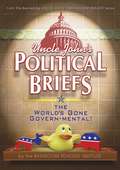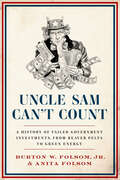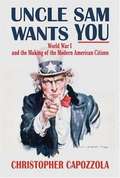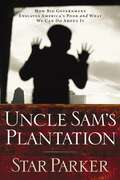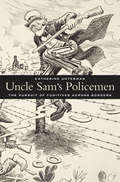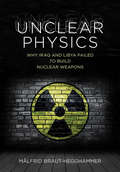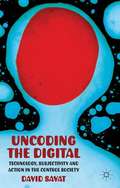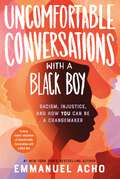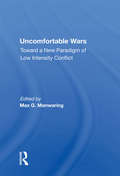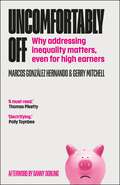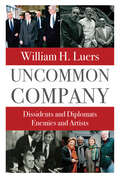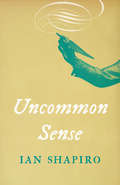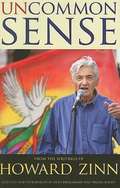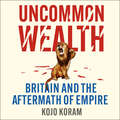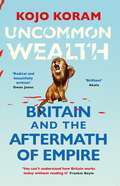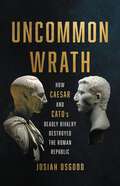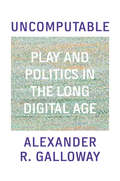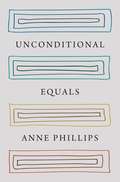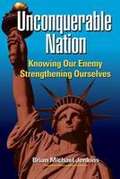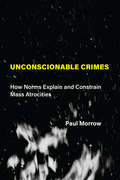- Table View
- List View
Uncle John's Political Briefs
by Bathroom Readers' InstituteNo one skewers public servants of all political stripes like Uncle John! Here's a no-holds-barred look at the history and lunacy of our govern-mental machine. Starting with the birth of democracy in the western world, you'll learn how today's political landscape was shaped and get an inside look at how government works (and doesn't work)--from Main Street to Wall Street to Pennsylvania Avenue to the world stage. These 288 pages consist of the most eye-opening political articles from the BRI's 25-year-history, plus a few all-new pieces ripped from the election-year headlines. So do your civic duty and read about . . .Toilet diplomacyGingrich vs. the GlitteratiWhy a donkey? Why an elephant?Animals that ran for office . . . and wonThe island election that was buried by a volcanic eruptionThe birth, death, and rebirth of America's major political partiesWhy the first U.S. congresswoman had to hide in a phone bothThe rapper who (nearly) took a swing at RomneyThe Russian czar who taxed the human soulThe secret plot to take down FDRPoisonous pundits And much, much more!
Uncle Sam Can't Count: A History of Failed Government Investments, from Beaver Pelts to Green Energy
by Burton W. Folsom Jr. Anita FolsomAn enlightening overview of America’s misadventures in economic investment from the Revolutionary era to the Obama administration.From the days of George Washington through World War II to today, government subsidies have failed the American people time and again. Draining the Treasury of cash, this doomed attempt to “pick winners” only serves to impede economic growth—and hurt the very companies receiving aid. But why does federal aid seem to have a reverse Midas touch? In Uncle Sam Can’t Count, Burt and Anita Folsom argue that federal officials don’t have the same abilities or incentives as entrepreneurs. In addition, federal control always leads to politicization. And what works for politicians often doesn’t work in the marketplace. Filled with examples of government failures and free market triumphs, from John Jacob Astor to the Wright Brothers, World War II amphibious landing craft to Detroit, Uncle Sam Can’t Count is a hard-hitting critique of government investment that demonstrates why business should be left exclusively to private entrepreneurs.
Uncle Sam Wants You: World War I and the Making of the Modern American Citizen
by Christopher CapozzolaUncle Sam Wants You tells the dramatic story of the mobilization of the American home front in World War I. In April 1917, the United States embarked on its first overseas war - with no history of conscription, an army smaller than Bulgaria's.
Uncle Sam and Us
by Stephen ClarksonBetween them, Brian Mulroney and Jean Chrétien radically altered the structure and functions of the federal government, first by signing and implementing major trade liberalization projects, and then by cutting back the size of their governments' budgets and the scope of their policies. Uncle Sam and Us analyzes the Mulroney-Chrétien era's impact on Canadian governance through two related factors, globalization from without and neoconservatism from within. Stephen Clarkson begins his study by conceptualizing the present Canadian state as a five-tiered, nested system stretching from the municipal and provincial levels, through the federal government, and on to the new continental and global spheres of governance: in effect, he argues, the North American Free Trade Agreement and the World Trade Organization have added a 'supraconstitution' to Canada's existing institutions. His analysis concerns the changes that have occurred not just in the federal government, but in provincial and municipal governance as well. The impact of globalization and neoconservatism is examined extensively in the second part of Clarkson's study, which examines how the functions of the Canadian state have altered. Clarkson addresses the changes in a number of policy areas such as macro and monetary policy, regulatory, industrial, and trade policy, as well as social, labour, environmental, cultural, and foreign policy.In linking external forces and internal factors in his analysis, Clarkson brings together separate aspects of the Canadian state into a comprehensive understanding of the current Canadian political climate. He combines a global knowledge of the international political economy with a micro concern for detailed analyses of policy issues, and concludes that the responsibility for Canada's predicament lies less with external forces, than with Canadians and the governments they elected. He ends with a hopeful look into the future, pointing towards a realization of the shortcomings of neoconservative globalization, and the expectation of a new governing paradigm.Co-published with Woodrow Wilson Center Press
Uncle Sam and You Part 2
by Charlene Notgrass Bethany Poore Ray Notgrass Mary Evelyn MccurdyUncle Sam and You is a one-year civics and government course for students in grades 5-8. Daily lessons teach your child about the foundations of American government, the elections process, and how Federal, state, and local governments work.
Uncle Sam and You: Part 1
by Charlene Notgrass Ray Notgrass Mary Evelyn MccurdyLearn more about American government and history in this Bible-based textbook for homeschoolers.
Uncle Sam's Plantation: How Big Government Enslaves America's Poor and What We Can Do About It
by Star ParkerAmerica has two economic systems: capitalism for the rich and socialism for the poor. This double-minded approach seems to keep the poor enslaved to poverty while the rich get richer. Let's face it, despite its $400 billion price tag, welfare isn't working. The solution, asserts Star Parker, is a faith-based, not state-sponsored, plan. In Uncle Sam's Plantation, she offers five simple yet profound steps that will allow the nation's poor to go from entitlement and slavery to empowerment and freedom. Parker shares her own amazing journey up from the lower rungs of the economic system and addresses the importance of extending the free market system to this neglected group of people. Emphasizing personal initiative, faith, and responsibility, she walks readers toward releasing the hold poverty has over their lives.
Uncle Sam's Policemen: The Pursuit of Fugitives across Borders
by Katherine UntermanExtraordinary rendition--abducting criminal suspects around the world--has been criticized as an unprecedented expansion of U.S. policing. But America's pursuit of fugitives beyond its borders predates the Global War on Terror. Katherine Unterman shows that the extension of manhunts into foreign lands formed an important chapter in American empire.
Unclear Physics: Why Iraq and Libya Failed to Build Nuclear Weapons (Cornell Studies in Security Affairs)
by Malfrid Braut-HegghammerMany authoritarian leaders want nuclear weapons, but few manage to acquire them. Autocrats seeking nuclear weapons fail in different ways and to varying degrees—Iraq almost managed it; Libya did not come close. In Unclear Physics, Malfrid Braut-Hegghammer compares the two failed nuclear weapons programs, showing that state capacity played a crucial role in the trajectory and outcomes of both projects. Braut-Hegghammer draws on a rich set of new primary sources, collected during years of research in archives, fieldwork across the Middle East, and interviews with scientists and decision makers from both states. She gained access to documents and individuals that no other researcher has been able to consult. Her book tells the story of the Iraqi and Libyan programs from their origins in the late 1950s and 1960s until their dismantling.This book reveals contemporary perspectives from scientists and regime officials on the opportunities and challenges facing each project. Many of the findings challenge the conventional wisdom about clandestine weapons programs in closed authoritarian states and their prospects of success or failure. Braut-Hegghammer suggests that scholars and analysts ought to pay closer attention to how state capacity affects nuclear weapons programs in other authoritarian regimes, both in terms of questioning the actual control these leaders have over their nuclear weapons programs and the capability of their scientists to solve complex technical challenges.
Uncoding the Digital
by David SavatDigital media are having an enormous impact on the world. From the seemingly mundane, like playing World of Warcraft, to posting a message on Twitter or Facebook, to the operation of financial markets, to transformations in science and the economy - digital media continue to revolutionize how people live their daily life. This book challenges how we understand our relationship with our digital machines, and shows how they open up a new capacity for action in the world. A capacity for action that we should no longer simply think of in terms of movement and force, but also in terms of flow and viscosity. A capacity for action that produces a politics of fluids, and finds its expression not only in new forms of social control, but also in a renewed ability for people to engage with the world and each other.
Uncomfortable Conversations with a Black Boy: Racism, Injustice, and How You Can Be a Changemaker
by Emmanuel AchoAdapted from Emmanuel Acho's New York Times bestseller Uncomfortable Conversations with a Black Man, comes an essential young readers edition aimed at opening a dialogue about systemic racism with our youngest generation.Young people have the power to affect sweeping change, and the key to mending the racial divide in America lies in giving them the tools to ask honest questions and take in the difficult answers. Approaching every awkward, taboo, and uncomfortable question with openness and patience, Emmanuel Acho connects his own experience with race and racism—from attending majority-white prep schools to his time in the NFL playing on majority-black football teams—to insightful lessons in black history and black culture. Uncomfortable Conversations with a Black Boy is just one way young readers can begin to short circuit racism within their own lives and communities.
Uncomfortable Wars: Toward A New Paradigm Of Low Intensity Conflict
by Max G ManwaringThis volume aims to operationalize General John R. Galvin's call for a new paradigm to fight the most prevalent form of conflict in the world today-insurgency. It contributes to the understanding needed to formulate and implement efforts in the contemporary international security arena.
Uncomfortably Off: Why Addressing Inequality Matters, Even for High Earners
by Marcos González Hernando Gerry MitchellIn highly unequal societies such as the UK, where the top 10% take a higher share of disposable income than in most other European countries, many feel resentment towards high earners. On paper, they are doing well, but inequality isn’t even working for them. Uncomfortably Off reveals that those generally considered to be the most affluent feel anxious about the future and struggle to keep up, or even to stay put. They are starting to doubt their common sense ideas about hard work and meritocracy as work pays less and less and life is becoming more uncomfortable. This book makes two crucial arguments. First, reducing income inequality will benefit everyone, even those quite near the top. Second, we need to understand the anxieties of high earners to understand their politics. As leading managers and professionals they have disproportionate influence on the institutions that rule over our public life. Their interests are ultimately not that dissimilar from those of the median earner: being able to afford a good quality of life in an ever more expensive and uncertain world. The hope of this book is to prompt high earners to question accepted truths and long-held beliefs that affect how they see themselves and judge others. In doing so, it seeks to help us all understand why dismissing the concerns of this group will not help in the fight to solve inequality.
Uncommon Company: Dissidents and Diplomats, Enemies and Artists
by William H. LuersAmbassador William Luers takes us on a fascinating journey from Springfield, Illinois, to Naples, Moscow, Washington DC, Venezuela, and Czechoslovakia, and then to his presidency at the Metropolitan Museum of Art, adventures in Cuba, and thereafter. In his revelatory memoir Uncommon Company, William Luers shares stories of his incredible career as a US diplomat to European and Latin American nations, where he introduced art and culture to forge common ground and community, improving the lives of citizens in many countries closed to Western ideas. From touring the Soviet Union with playwright Edward Albee in the 1960s to bringing such famous writers and artists as John Updike, Arthur Miller, William Styron, Peter Matthiessen, Francine du Plessix Gray, Richard Diebenkorn, and Frank Stella to Venezuela and Prague during his ambassadorships in Venezuela and Czechoslovakia, Bill Luers&’ practice of cultural diplomacy became known as his ability to wield &“soft power&” that strengthened US relationships wherever he served. After more than thirty years with the State Department, Luers brought his art expertise to New York&’s Metropolitan Museum of Art as its president, where he secured the Annenberg Collection of Impressionist and Post-Impressionist works by such masters as Van Gogh, Picasso, and Cézanne, among many other accomplishments. Uplifting and inspirational, William Luers&’ Uncommon Company is the true story of a life well lived, celebrating the challenges and triumphs found in the virtues of being a servant leader.
Uncommon Sense
by Ian ShapiroA spirited defense of the Enlightenment against assaults from both the left and the right that explains its urgent implications for our contemporary politics Ours is an age when optimism about politics is hard to come by. Ian Shapiro explains why this is so and, without minimizing the daunting challenges, spells out an appropriate response. Written in the indomitable spirit exemplified by Tom Paine, Uncommon Sense is a rich source of insight and inspiration in dark political times. The Enlightenment commitments to reason and science are under assault from the Postmodern Left and the Authoritarian Right. Shapiro explains why the attacks are misguided and politically destructive. He agrees with the critics that there are no universal principles of justice that transcend political battles and no fair, impartial rules to govern the distribution of income, wealth, rights, or opportunities. But abandoning the search for them as futile does not mean junking the Enlightenment&’s core political goal: to deploy the tools of reason and science to fight domination. Democracy is essential to vindicating that goal, yet citizens in many democracies are profoundly alienated and many democracies are in danger of failing. Shapiro explains what has gone wrong, debunks ill-considered remedies, and spells out better ones—deepening and extending his previous writing on political theory and democratic politics.
Uncommon Sense from the Writings of Howard Zinn
by Howard ZinnThis volume collects short quotations from across the works of Howard Zinn, the leftist American historian perhaps best known for his A People's History of the United States. The quotations generally read as aphorisms (e. g. "History is not inevitably useful. It can bind us or free us." and "At its worst, war has been mass slaughter without even the saving grace of a definable social goal.") that together provide a broad overview of Zinn's thinking on (citing the chapter titles): history, government, war and peace, class, racism and resistance, law and justice, Marxism and anarchism, and taking action.
Uncommon Wealth: Britain and the Aftermath of Empire
by Kojo Koram'BRILLIANTLY ARRANGED AND RICH WITH FRESH INSIGHTS, UNCOMMON WEALTH REMINDS US HOW THE FORGOTTEN STORIES OF EMPIRE AND DECOLONISATION CONTINUE TO IMPACT OUR DAILY LIVES IN BRITAIN - AND THROUGHOUT THE WORLD - UP TO TODAY' AKALABritain didn't just put the empire back the way it had found it.In Uncommon Wealth, Kojo Koram traces the tale of how after the end of the British empire an interconnected group of well-heeled British intellectuals, politicians, accountants and lawyers offshored their capital, seized assets and saddled debt in former 'dependencies'. This enabled horrific inequality across the globe as ruthless capitalists profited and ordinary people across Britain's former territories in colonial Africa, Asia and the Caribbean were trapped in poverty. However, the reinforcement of capitalist power across the world also ricocheted back home. Now it has left many Britons wondering where their own sovereignty and prosperity has gone...Decolonisation was not just a trendy buzzword. It was one of the great global changes of the past hundred years, yet Britain - the protagonist in the whole, messy drama - has forgotten it was ever even there. A blistering uncovering of the scandal of Britain's disastrous treatment of independent countries after empire, Uncommon Wealth shows the decisions of decades past are contributing to the forces that are breaking Britain today.(P) Hodder & Stoughton Limited
Uncommon Wealth: Britain and the Aftermath of Empire
by Kojo Koram'BRILLIANTLY ARRANGED AND RICH WITH FRESH INSIGHTS, UNCOMMON WEALTH REMINDS US HOW THE FORGOTTEN STORIES OF EMPIRE AND DECOLONISATION CONTINUE TO IMPACT OUR DAILY LIVES IN BRITAIN - AND THROUGHOUT THE WORLD - UP TO TODAY' AKALA'A RADICAL, BEAUTIFULLY WRITTEN UNDERSTANDING OF OUR HISTORY - INGENIOUSLY PLACING BRITAIN'S RECENT TUMULT INTO CONTEXT' - OWEN JONESBritain didn't just put the empire back the way it had found it.In Uncommon Wealth, Kojo Koram traces the tale of how after the end of the British empire an interconnected group of well-heeled British intellectuals, politicians, accountants and lawyers offshored their capital, seized assets and saddled debt in former 'dependencies'. This enabled horrific inequality across the globe as ruthless capitalists profited and ordinary people across Britain's former territories in colonial Africa, Asia and the Caribbean were trapped in poverty. However, the reinforcement of capitalist power across the world also ricocheted back home. Now it has left many Britons wondering where their own sovereignty and prosperity has gone...Decolonisation was not just a trendy buzzword. It was one of the great global changes of the past hundred years, yet Britain - the protagonist in the whole, messy drama - has forgotten it was ever even there. A blistering uncovering of the scandal of Britain's disastrous treatment of independent countries after empire, Uncommon Wealth shows the decisions of decades past are contributing to the forces that are breaking Britain today.
Uncommon Wealth: Britain and the Aftermath of Empire
by Kojo Koram'BRILLIANTLY ARRANGED AND RICH WITH FRESH INSIGHTS, UNCOMMON WEALTH REMINDS US HOW THE FORGOTTEN STORIES OF EMPIRE AND DECOLONISATION CONTINUE TO IMPACT OUR DAILY LIVES IN BRITAIN - AND THROUGHOUT THE WORLD - UP TO TODAY' AKALABritain didn't just put the empire back the way it had found it.In Uncommon Wealth, Kojo Koram traces the tale of how after the end of the British empire an interconnected group of well-heeled British intellectuals, politicians, accountants and lawyers offshored their capital, seized assets and saddled debt in former 'dependencies'. This enabled horrific inequality across the globe as ruthless capitalists profited and ordinary people across Britain's former territories in colonial Africa, Asia and the Caribbean were trapped in poverty. However, the reinforcement of capitalist power across the world also ricocheted back home. Now it has left many Britons wondering where their own sovereignty and prosperity has gone...Decolonisation was not just a trendy buzzword. It was one of the great global changes of the past hundred years, yet Britain - the protagonist in the whole, messy drama - has forgotten it was ever even there. A blistering uncovering of the scandal of Britain's disastrous treatment of independent countries after empire, Uncommon Wealth shows the decisions of decades past are contributing to the forces that are breaking Britain today.
Uncommon Wrath: How Caesar and Cato's Deadly Rivalry Destroyed the Roman Republic
by Josiah OsgoodA dual biography of Julius Caesar and Cato the Younger that offers a dire warning: republics collapse when partisanship overrides the common good. In Uncommon Wrath, historian Josiah Osgood tells the story of how the political rivalry between Julius Caesar and Marcus Cato precipitated the end of the Roman Republic. As the champions of two dominant but distinct visions for Rome, Caesar and Cato each represented qualities that had made the Republic strong, but their ideological differences entrenched into enmity and mutual fear. The intensity of their collective factions became a tribal divide, hampering their ability to make good decisions and undermining democratic government. The men&’s toxic polarity meant that despite their shared devotion to the Republic, they pushed it into civil war. Deeply researched and compellingly told, Uncommon Wrath is a groundbreaking biography of two men whose hatred for each other destroyed the world they loved.
Uncomputable: Play and Politics In the Long Digital Age
by Alexander GallowayA journey through the uncomputable remains of computer historyNarrating some lesser known episodes from the deep history of digital machines, Alexander R. Galloway explains the technology that drives the world today, and the fascinating people who brought these machines to life. With an eye to both the computable and the uncomputable, Galloway shows how computation emerges or fails to emerge, how the digital thrives but also atrophies, how networks interconnect while also fray and fall apart. By re-building obsolete technology using today's software, the past comes to light in new ways, from intricate algebraic patterns woven on a hand loom, to striking artificial-life simulations, to war games and back boxes. A description of the past, this book is also an assessment of all that remains uncomputable as we continue to live in the aftermath of the long digital age.
Unconditional Equality: Gandhi's Religion of Resistance (Cultural Critique Books)
by Ajay SkariaUnconditional Equality examines Mahatma Gandhi&’s critique of liberal ideas of freedom and equality and his own practice of a freedom and equality organized around religion. It reconceives satyagraha (passive resistance) as a politics that strives for the absolute equality of all beings. Liberal traditions usually affirm an abstract equality centered on some form of autonomy, the Kantian term for the everyday sovereignty that rational beings exercise by granting themselves universal law. But for Gandhi, such equality is an &“equality of sword&”—profoundly violent not only because it excludes those presumed to lack reason (such as animals or the colonized) but also because those included lose the power to love (which requires the surrender of autonomy or, more broadly, sovereignty).Gandhi professes instead a politics organized around dharma, or religion. For him, there can be &“no politics without religion.&” This religion involves self-surrender, a freely offered surrender of autonomy and everyday sovereignty. For Gandhi, the &“religion that stays in all religions&” is satyagraha—the agraha (insistence) on or of satya (being or truth).Ajay Skaria argues that, conceptually, satyagraha insists on equality without exception of all humans, animals, and things. This cannot be understood in terms of sovereignty: it must be an equality of the minor.
Unconditional Equals
by Anne PhillipsWhy equality cannot be conditional on a shared human “nature” but has to be for allFor centuries, ringing declarations about all men being created equal appealed to a shared human nature as the reason to consider ourselves equals. But appeals to natural equality invited gradations of natural difference, and the ambiguity at the heart of “nature” enabled generations to write of people as equal by nature while barely noticing the exclusion of those marked as inferior by their gender, race, or class. Despite what we commonly tell ourselves, these exclusions and gradations continue today. In Unconditional Equals, political philosopher Anne Phillips challenges attempts to justify equality by reference to a shared human nature, arguing that justification turns into conditions and ends up as exclusion. Rejecting the logic of justification, she calls instead for a genuinely unconditional equality.Drawing on political, feminist, and postcolonial theory, Unconditional Equals argues that we should understand equality not as something grounded in shared characteristics but as something people enact when they refuse to be considered inferiors. At a time when the supposedly shared belief in human equality is so patently not shared, the book makes a powerful case for seeing equality as a commitment we make to ourselves and others, and a claim we make on others when they deny us our status as equals.
Unconquerable Nation: Knowing Our Enemy, Strengthening Ourselves
by Brian Michael JenkinsThe author presents a clear-sighted and sobering analysis of where we are today in the struggle against terrorism. Jenkins, an internationally renowned authority on terrorism, distills the jihadists?? operational code and outlines a pragmatic but principled approach to defeating the terrorist enterprise. We need to build upon our traditions of determination and self-reliance, he argues, and above all, preserve our commitment to American values.
Unconscionable Crimes: How Norms Explain and Constrain Mass Atrocities
by Paul C. MorrowThe first general theory of the influence of norms--moral, legal and social--on genocide and mass atrocity.How can we explain--and prevent--such large-scale atrocities as the Holocaust? In Unconscionable Crimes, Paul Morrow presents the first general theory of the influence of norms--moral, legal and social--on genocide and mass atrocity. After offering a clear overview of norms and norm transformation, rooted in recent work in moral and political philosophy, Morrow examines numerous twentieth-century cases of mass atrocity, drawing on documentary and testimonial sources to illustrate the influence of norms before, during, and after such crimes.
